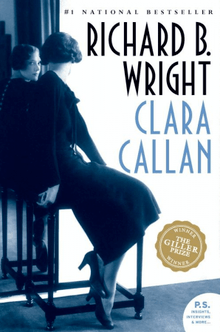Clara Callan
 Clara Callan book cover | |
| Author | Richard B. Wright |
|---|---|
| Country | Canada |
| Language | English |
| Publisher | HarperCollins |
Publication date | September 2001 |
| Media type | |
| Pages | 448 |
| ISBN | 978-1554684809 |
Clara Callan is a novel by Canadian writer Richard B. Wright, published in 2001. It is the story of a woman in her thirties living in Ontario during the 1930s and is written in epistolary form, utilizing letters and journal entries to tell the story. The protagonist, Clara, faces the struggles of being a single woman in a rural community in the early 20th century. The novel won the Governor General's Award in English fiction category, the Scotiabank Giller Prize, and the Trillium Book Award.
Plot
Clara and Nora are sisters. Clara stays in her family home in a rural community of Whitley, near Toronto, Ontario, after her father's death, while Nora moves to New York to pursue a glamorous career in radio soap operas. Their mother died, from a possible suicide when Clara, the eldest, was around ten. Her father was a principal in a local school and raises the two daughters. She lives a simple life of a school teacher, loves playing piano and composes poems. She is an independent woman who finds it difficult to live freely in the traditional rural community. She writes letters to her sister and Nora's lesbian writer friend Evelyn Dowling and also maintains a journal.
Global politics begin affecting their lives when Europe approaches World War II. Nora's letters start narrating how the glamorous life of the big city is fake and the events in Clara's life break her solitude. One fateful day, when Clara goes out in the evening for a stroll, she is raped by two vagabond travelers. Discovering that she is pregnant, Clara reaches out to her sister in New York, gets an abortion, and returns to her life, hoping it to be peaceful again. She meets a man in a movie theater and falls in love with him. But the relationship gets turbulent as he is married and Clara sees herself again in the midst of trying events. Clara ponders her past and looks for future options, and the bond between the two sisters is put to the test.
Publishing and development
Clara Callan is Wright's ninth novel.[1] The novel begins in 1934 and ends in 1939. It includes themes of economics in the depression-era, sexual politics, greedy male sexuality, and the advent and influence of radio and movies in North America.[2] The letters written by Clara have a formal tone whereas those written by Nora include colloquialisms.[3] The novel was published by HarperCollins in September 2001 and reported to have sold approximately 200,000 copies.[4] It was edited by Phylis Bruce, and Wright took nearly five years to complete the novel, and in his memoir A Life with Words: A Writer's Memoir calls it as "the most difficult to write".[5]:186, 191
Reception and review
Quill & Quire calls the book a page-turner and "[a] lovely mix of highbrow literature and lowbrow melodrama." [2] Carol Birch writing for The Guardian notes the able mix of contrast in the novel as "a sense of the turbulence beneath the surface calm of small lives in small towns underpins this beautiful and subtle book." [3] Kirkus Reviews in their starred review of the novel noted it to be based similarly to Arnold Bennett's classic 1908 novel, The Old Wives' Tale.[1] Online magazine BookBrowse calls it "a mesmerizing tribute to friendship and sisterhood, romance and redemption."[6]
Awards
The novel was presented with the 2001 Governor General's Awards for English-language fiction having been shortlisted along with Life of Pi (by Yann Martel), Dragons Cry (by Tessa McWatt), The Stone Carvers (by Jane Urquhart), and Salamander (by Thomas Wharton). [7] The book also won the Scotiabank Giller Prize where it was shortlisted along with, The Russlander (by Sandra Birdsell), River Thieves (by Michael Crummey), Martin Sloane (by Michael Redhill), Stanley Park (by Timothy Taylor), and again The Stone Carvers (by Jane Urquhart). The award was judged by novelist David Adams Richards, author Joan Clark, and journalist Robert Fulford.[8] It also won the Trillium Book Award and became the first book to have won all the three awards.[4] Wright had earlier received nominations for both the Giller Prize and the Governor General's Award in 1995 for his novel The Age of Longing.[8][9][10] Wright was awarded Author of the Year, and the novel was awarded Fiction Book of the Year at the Canadian Booksellers Association Libris Awards in 2002.[11]
References
- 1 2 "Kirkus Review: Clara Callan". Kirkus Reviews. 1 August 2002. Retrieved 21 March 2017.
- 1 2 Jackson, Lorna (September 2001). "Reviews: Clara Callan by Richard B. Wright". Quill & Quire. Retrieved 21 March 2017.
- 1 2 Carol Birch (12 October 2002). "Grit and glamour". The Guardian. Retrieved 21 March 2017.
- 1 2 Medley, Mark (8 February 2017). "Canadian novelist Richard B. Wright, author of Clara Callan, dies at 79". The Globe and Mail. Retrieved 21 March 2017.
- ↑ Wright, Richard B. (2015). A Life with Words: A Writer's Memoir. Simon and Schuster. p. 224. ISBN 1476785368.
- ↑ "Clara Callan A novel". BookBrowse. Retrieved 21 March 2017.
- ↑ Sandra Martin (24 October 2001). "The kindest cut of all: The G-G's shortlist". The Globe and Mail. Retrieved 21 March 2017.
- 1 2 "Scotiabank Giller Prize: past winners and jury". Scotiabank Giller Prize. Retrieved 21 March 2017.
- ↑ "People: Richard B. Wright". The Canadian Encyclopedia. Retrieved 21 March 2017.
- ↑ "Author Richard B. Wright Wins The 2001 Giller Prize". Scotiabank. 6 November 2001. Retrieved 21 March 2017.
- ↑ "Winner History: Libris Awards" (PDF). Retail Council. Retrieved 22 March 2017.